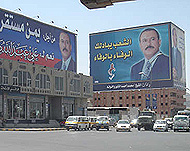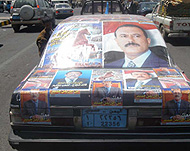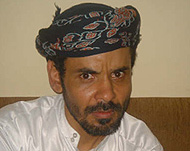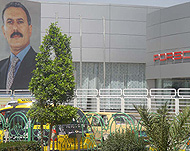Election fever grips Yemen
As Yemen prepares for the most fiercely contested general election in its history, the country’s most popular singer is doing a roaring trade in his latest album – a blistering attack on the Yemeni president.

“Who’s to blame for corruption? Who’s getting the spoils of the country?” sings Mohammed al-Adhrai on Who’s to Blame?, the title track of the new album.
In the last few weeks, Who’s to Blame? has sold over 50,000 copies. Al-Adhrai says its popularity shows that Yemen’s presidential election on September 20 is being taken seriously by both the government and voters.
“People love our tapes. They know that we care about their issues, and we don’t attack or insult anyone. So we’ve made a special effort for the elections,” al-Adhrai told Aljazeera.net.
Yemen’s presidential election will be one of the freest ever to take place in the Arab world.
However, the vote is also expected to result in another five-year term for Ali Abdullah Saleh, the current president who has ruled Yemen for 28 years since 1978.
Saleh has said that the decision to gradually open Yemen to democracy has been his choice and not the result of US pressure.
In an interview with Aljazeera, Saleh was asked: “Why do it? Why go through these elections this way and allow for competition to exist?”
Saleh answered: “I want to create a democratic system and for Yemen to be an example for other [Arab] countries.”
Election fever
With only a few days before the country goes to the polls, election fever can be seen everywhere in Sana, the Yemeni capital, where billboards and posters line almost every street – mostly in support of the president.
“You Are Our Choice”, “There’s No Alternative”‘, “The People Repay Your Loyalty” … “With Loyalty” are some of slogans accompanying giant portraits of Saleh.
 |
|
The Yemen vote will be one of |
Many of the billboards bear the name of their sponsors: The International Bank of Yemen, the Yeefko Group, Jaeedi Trading Group. Even Yemen’s only Porsche dealership proclaims its allegiance to Saleh.
The volume of campaign posters underscores the fact that Saleh faces a real challenge for the leadership – for the first time in 28 years.
The leading opposition candidate is Faisal Bin Shamlaan, the candidate for the Joint Meeting Parties, a conglomeration of opposition parties whose most prominent member is Islah, the country’s leading Islamic party.
Bin Shamlaan, a former oil minister, has positioned himself as a candidate who will fight corruption.
His slogan is “A President for Yemen, Not a Yemen for its President”.
Bin Shamlaan has credibility for having previously resigned from a government post in a protest against what he called corruption in Yemeni politics.
In addition to Saleh and Bin Shamlaan, the other three candidates are Ahmad al-Majidi and Fathi al-Azab, and Yasin Abdu Saeed, the National Opposition Assembly candidate.
Bin Shamlaan is expected to lose the election but garner at least 30 per cent of the total votes. In Yemen’s last presidential election in 1999, Saleh was declared the winner after authorities said he had won 96.4 per cent of the votes cast.
Opposition
Saleh’s stated intention to slowly democratise Yemen has been undermined, however, by the opposition parties, who have been reluctant to fully contest the presidency.
Islah, Yemen’s main Islamic party and the largest opposition movement, has not fielded its own candidate for the elections and has instead fought a low-key campaign in support of Bin Shamlaan.
In fact, Sheikh Abdullah Al-Ahmar, Islah’s chairman and leader of the Haashid tribe, Yemen’s largest, endorsed Saleh’s candidacy saying: “Better the devil you know than the angel you don’t.”
 |
|
For the first time, Saleh faces a |
Other prominent opposition figures have also thrown their support behind Saleh.
Abdul Rahman al-Jafri, chairman of the League of Yemen’s Sons Party and former vice-president of South Yemen, returned from 12 years’ in exile last week to declare: “President Ali Abdullah Saleh is no angel devoid of mistakes and lapses.
“But we looked at the list of candidates and found that he is the right man to lead the nation at the moment.”
Fraud allegations
As the election day approaches, opposition parties have increasingly accused the government and police of supporting the president’s candidacy amid widespread allegations of voter intimidation.
In the Sana district of Mesayk, home to many Yemeni “Afghan-Arabs” [veterans of the 1980s jihad against the Soviet Union], many residents accuse policemen and government officials of tearing down opposition posters.
 |
|
Popular singer al-Adhrai blames |
One local man, Ahmed, said that the authorities have removed all Bin Shamlaan posters that he had put up on the facade of his house.
“Imagine what would happen if I were to rip down the pictures of President Saleh?” he said.
Al-Adhrai, the singer, was himself detained for several days in June for “mocking the voice of the president”, a charge he denies.
He says that although Yemen is freer than other Arab countries, people are never sure on what is permitted and what is not.
“You learn as you go along, from experience,” al-Adhrai said with a smile.
Media’s role
The Yemeni government has pulled out all the stops to encourage Yemenis to vote – perhaps fearing that a low turnout could favour Bin Shamlaan.
As more than half the country is illiterate, the popular national radio station has played a key role.
 |
|
Many big companies are openly |
In one public information broadcast, a Yemeni informs his compatriots of the date for voting, September 20.
“So it has to be on the twentieth?” his friend asks. “I can’t vote on the nineteenth or twenty-first?”
He is told: “Nope. The whole of Yemen will vote on one day.”
Another radio sketch, featuring a Yemeni housewife, aims to persuade Yemenis not to take their weapons to polling stations and to make September 20 a ‘Weapon-Free Day”.
Trusty Kalashnikov
In the sketch as the woman checks her and her husband’s voter registration cards before leaving for the polling centre, the latter reaches for his trusty Kalashnikov – routinely carried by Yemeni men in rural areas.
Told – to his initial disappointment – that he’s not allowed to take the assault rifle with him to the voting booth, the man cheers up when he is told that a weapon-free election will enable the voter to “freely elect the candidate of his choice”.
The results of the presidential and local elections are due to be announced on September 21.